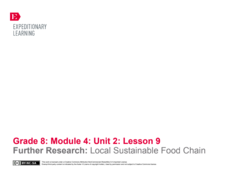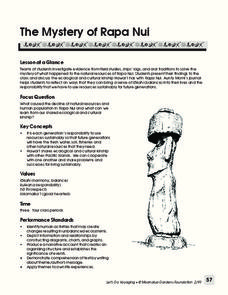Gobal Oneness Project
Passionate Pursuits
Not all technology is digital. Teach learners about the low-tech maker movement with a photo essay about six artisans from California and two articles about the local creator movement. After tackling the photo essay in small groups,...
Curated OER
Sustainability and the Recycling of Words
Recycling and green living isn't just for the environment anymore. Studying the use of metaphors and metonymies, especially in reference to environmental sustainability, this presentation provides viewers with plenty of food for thought....
California Academy of Science
Sustainable Food Solutions: Weighing the Pros and Cons
A growing demand for sustainable food systems comes from schools and even some cities. So what are some solutions? Scholars consider four different ways to approach sustainable food solutions and list the pros and cons of each. The fifth...
Virginia Department of Education
Using Specific Vocabulary and Collaboration
Develop concepts on how to change your improving wordsmiths' writing from blah to wow with the activities and ideas in this resource. The instructor provides the class with examples of writing that lacks detail and precision, and then...
New York City Department of Education
Dance and Text
Use texts and dances to teach inequalities and equations. A sixth-grade unit covers using variables in equations and inequalities to solve problems. Learners show what they know at the end of the unit using two performance tasks, one...
New York City Department of Education
How I Roll
There's a high likelihood for learner success in this set of probability problems and activities. From support activities that walk learners through joint and compound probabilities through the cumulative activity of planning to win a...
Global Oneness Project
Ancient and Modern Worlds
The old aphorism, "The road to Hell is paved with good intentions," might well serve as the title for a resource that asks viewers to consider the plight of the people of the Gamo Highlands, an area in southwestern Ethiopia. These...
Curated OER
SUSTAINABLE AGRISCIENCE
Students, after defining sustainable agriscience, distinguishing between renewable and nonrenewable resources and identify the basic components of a sustainable agriscience system, develop a sustainable agriscience system. They research...
Curated OER
Sustainability
Fifth graders investigate the concept of natural resources. They participate in a simulation project to see possible uses. They use the internet to study how Hacienda Verde is used as a model for others for sustainable coffee crops.
Curated OER
Earth: The Source of Resources
Students study responsible stewardship and natural resources. In this natural resources lesson, students share their motto's about the environment with the class. Students then discuss the regulations in 'Rules and Regulations for...
Wish for the Future
Wish for the Future
What would be your class's ideal world 30 years in the future? What about 100 years? Use a series of activities to discuss globalization, sustainability, scientific contributions to society, and the global community of which your...
EngageNY
Further Research: Local Sustainable Food Chain
Researchers review how to create citations, find reliable sources, and paraphrase. Next, using guided task cards and their researcher's notebooks, they investigate the question they developed in instructional activity eight about the...
EngageNY
Adding to Cascading Consequences and Stakeholders: Local Sustainable Food Chain
Equip the class to perfect their presenting skills. To prepare for an upcoming oral presentation, scholars create and analyze an anchor chart for effective speaking skills. Pupils also use their research to add to their Cascading...
EngageNY
Reading for Gist and Answering Text-Dependent Questions: Local Sustainable Food Chain
Readers use sticky notes and a Reading Closely: Guiding Questions handout to record the gist of a different section (pages 161-166) in The Omnivore’s Dilemma. They then pair up and share their ideas. To end the lesson, readers complete...
EngageNY
Evaluating an Argument: The Polyface Local Sustainable
Who has the better argument? Class members work in small groups to compare the arguments on the Example of Strong and Flawed Arguments sheet. They then analyze Michael Pollan’s argument on pages 161–166 of The Omnivore’s Dilemma and...
EngageNY
End of Unit 2 Assessment, Part 1B: Fishbowl on Better Use of Water in Industry
Listen up, it's time for a Fishbowl discussion! Scholars continue their discussions about water management in industry and agriculture. After hearing both sides of the debate, pupils complete graphic organizers, deciding which sector is...
NOAA
Vertebrates I
I spy a spine. The 19th installment of a 23-part NOAA Enrichment in Marine sciences and Oceanography (NEMO) program explores vertebrate species, such as sharks and other fish. Learners take part in an activity evaluating the...
California Academy of Science
Exploring Our Growing Need for Water
Pupils explore the amount of water people use in agriculture and for personal use. They compare water usage for various crops to that of raising animals before considering solutions for increased access to safe drinking water worldwide....
Curated OER
An Exploration of Cradle-to-Cradle Design Thinking
Introduce cradle-to-cradle design thinking. Scholars first discuss the importance of natural laws and rights. They then use a variety of online and print resources to research eco-efficiency and cradle-to-cradle design.
Advocates for Human Rights
The Right to a Clean Environment in the United States
Even if a school has gone digital, chances are there's still plenty of paper being used. The three activities help scholars learn about the environmental impact of paper and another consumer products of their choosing, the issue of...
Teach Engineering
Solar Power
How much solar energy is available at my location? An engaging resource provides a presentation along with script to give the class background information on determining solar radiation. Pupils then work through a worksheet to estimate...
Moanalua Gardens Foundation
The Mystery of Rapa Nui
What caused the collapse of the environment on Rapa Nui (Easter Island)? Who constructed the Moai? What was their purpose? Class members assume the role of investigators and use evidence drawn from field studies, ships' logs, and...
San Francisco Public Utilities Commission
Our Water: Many Users - Many Uses
California's water supply is not always stable. Learn about the ways that California weathers a drought with a reading activity about water usage and agriculture. Once kids finish the reading passage, they answer a series of...
Curated OER
Selecting the Best Material to Use While Solving Technological Problems
Students examine natural resources and discuss their pros and cons. In this sustainable environment lesson, students describe reasons to use specific resources when faced with different problems, specifically why wood is a great...

























